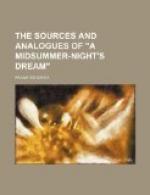HOW ROBIN GOOD-FELLOW SERVED A TAPSTER FOR NICKING HIS POTS
There was a tapster, that with his pots’ smallness, and with frothing of his drink, had got a good sum of money together. This nicking of the pots he would never leave, yet divers times he had been under the hand of authority, but what money soever he had [to pay] for his abuses, he would be sure (as they all do) to get it out of the poor man’s pot again. Robin Good-fellow, hating such knavery, put a trick upon him in this manner.
Robin shaped himself like to the tapster’s brewer, and came and demanded twenty pounds which was due to him from the tapster. The tapster, thinking it had been his brewer, paid him the money, which money Robin gave to the poor of that parish before the tapster’s face. The tapster praised his charity very much, and said that God would bless him the better for such good deeds: so after they had drank one with the other, they parted.
Some four days after the brewer himself came for his money: the tapster told him that it was paid, and that he had a quittance from him to show. Hereat the brewer did wonder, and desired to see the quittance. The tapster fetched him a writing, which Robin Good-fellow had given him instead of a quittance, wherein was written as followeth, which the brewer read to him—
I, Robin Good-fellow, true man and honest man, do acknowledge to have received of Nick and Froth, the cheating tapster, the sum of twenty pounds, which money I have bestowed (to the tapster’s content) among the poor of the parish, out of whose pockets this aforesaid tapster had picked the aforesaid sum, not after the manner of foisting, but after his excellent skill of bombasting[11], or a pint for a penny.
If now thou wilt go hang thyself,
Then take thy apron strings;
It doth me good when such foul birds
Upon the gallows sings.
Per me ROBIN GOOD-FELLOW.
At this the tapster swore Walsingham; but for all his swearing, the brewer made him pay him his twenty pounds.
HOW KING OBREON[12] CALLED ROBIN GOOD-FELLOW TO DANCE
King Obreon, seeing Robin Good-fellow do so many honest and merry tricks, called him one night out of his bed with these words, saying—
Robin, my son, come quickly, rise:
First stretch, then yawn, and rub your eyes;
For thou must go with me to-night,
To see, and taste of my delight.
Quickly come, my wanton son;
’Twere time our sports were now begun.
Robin, hearing this, rose and went to him. There were with King Obreon a many fairies, all attired in green silk; all these, with King Obreon, did welcome Robin Good-fellow into their company. Obreon took Robin by the hand and led him a dance: their musician was little Tom Thumb; for he had an excellent bag-pipe made of a wren’s quill, and the skin of a Greenland louse: this pipe was so shrill, and so sweet, that a Scottish pipe compared to it, it would no more come near it, than a Jew’s-trump doth to an Irish harp. After they had danced, King Obreon spake to his son, Robin Good-fellow, in this manner—




